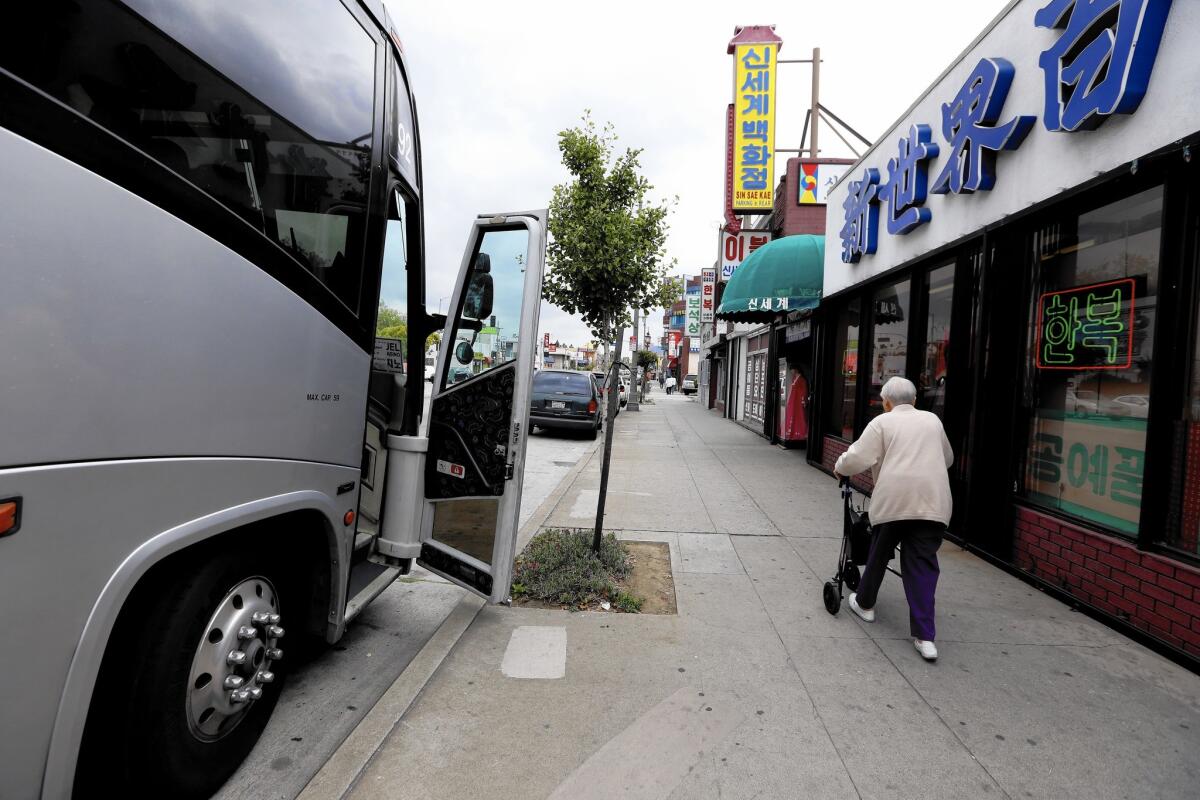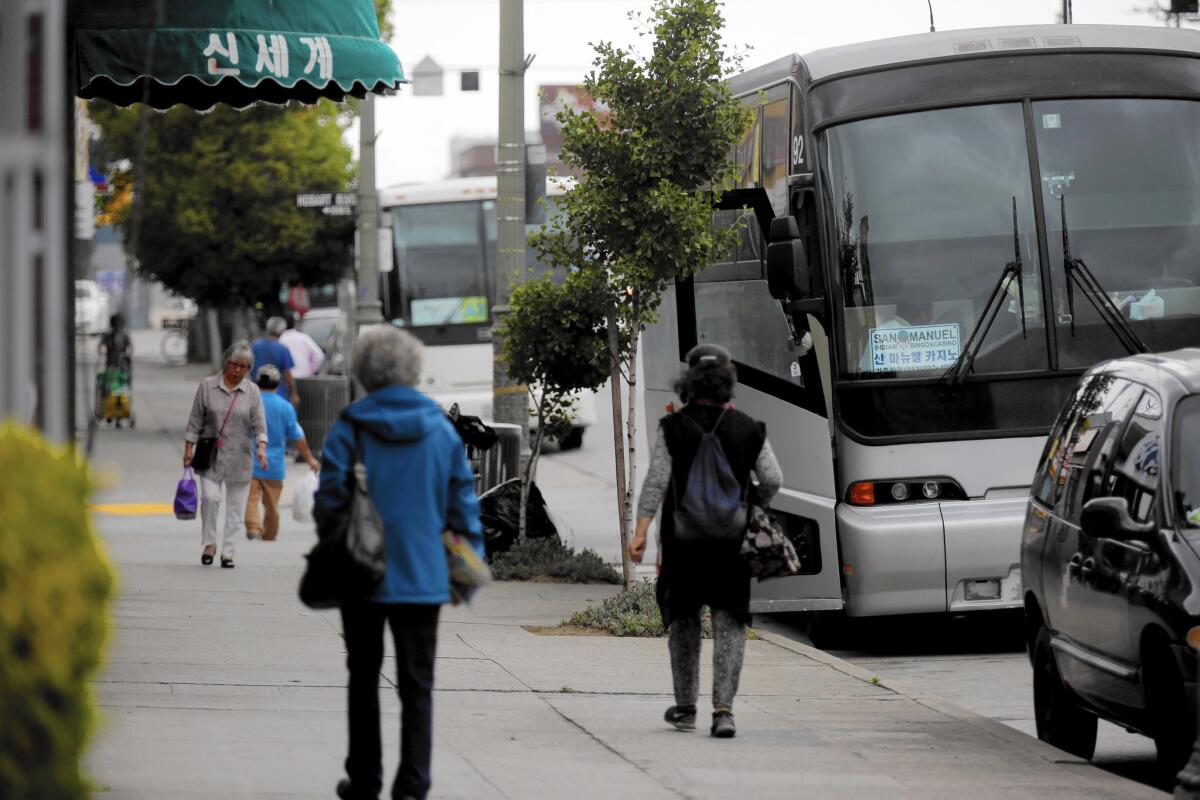Koreatown’s elderly immigrants find the lure of the casino bus a blessing and a curse

- Share via
Soo Bong Oh first got on the bus sometime after the elderly neighbor across the hall passed away.
It may have been seven, eight years ago, or maybe it’s been more than 10. At 85, the years blend into one another.
The neighbor lady, who was illiterate, had a hunched back and lived alone, occasionally hinted at her regular jaunts to one or another of Southern California’s myriad casinos. She was “going to the Indian,” she’d say.
After the woman died, Oh heard a rumor among the Korean seniors in their building that several thousands in cash was found squirreled away in the lady’s apartment, presumably from her gambling runs.
Oh had never gambled before, not even with friends. But for a senior living alone in a tiny apartment in a foreign land, the days are long and any excuse to get out welcome.
So she hopped on one of the several dozen tour buses that sit spewing exhaust along Olympic Boulevard, waiting to shuttle gamblers from Koreatown to many of Southern California’s dozens of casinos, from Santa Barbara to San Diego County.

The buses depart Koreatown daily, leaving as early as 6:30 a.m. A few years ago, one casino honored the owner of a Koreatown-based tour company for delivering her 1 millionth customer to the gambling hall.
Camped in front of one colorful dinging slot machine, and then the next, it didn’t matter that she didn’t speak English or that she’d never worked in the U.S. She forgot about the good-for-nothing husband who died years ago, the children and grandchildren she seldom saw, the aches and pains that come with her advanced age. The hours whizzed by.
After that first visit left her feeling alive with adrenaline for the first time in years, Oh joined the fraternity of Koreatown seniors who make the weekly or daily pilgrimage.
Sometimes Oh wonders how things would have turned out if she never got on that bus, never got that first taste. At times, she resists going for a few weeks at a stretch.
Then the casino sends a coupon for a free buffet or advertises a giveaway of colorful cast iron pots, and she finds herself on the bus once more.
::
The buses depart daily, leaving as early as 6:30 a.m. and returning as late as 4 a.m., offering essentially free rides — after the casinos’ incentives — across Southern California.
Most are run by independent bus companies that are compensated by the casinos for each customer they bring. A few years ago, one casino honored the owner of a Koreatown-based tour company for delivering her 1 millionth customer to the gambling hall.
In Koreatown, the buses have found a steady and reliable customer base in elderly immigrants, many of whom are widows or widowers living alone in senior apartments. The riders come from a group that is largely invisible, low-income or poor.
The popularity has led to a clog of buses idling along Olympic Boulevard and nearby side streets, taking up parking, obstructing businesses’ views and waking residents at odd hours.
For more than a decade, city officials, police and the neighborhood council have been fielding complaints from businesses and residents but have been unable to do much more than shuffle the problem from one block to the next. In January, one bus that had returned from Morongo Casino killed an elderly woman crossing the street in a hit-and-run that remains unsolved.
For the seniors who ride the buses, the service is both a blessing and a curse: a welcome distraction and pastime — an air-conditioned one for the long summer days — but at the same time a habit that seniors say can quickly become disastrous for their finances, especially for those on Social Security.
::
On a cloudless Thursday, Oh, with a tightly permed dyed hairdo and a spring in her step that makes her look younger than her age, boarded the noon bus outside a Koreatown bedding store.
She forked over $20 to the man collecting the fares and plopped down amid a group of Korean seniors in the front of the nearly full bus. Once at the casino, she knew she’d be receiving $35 or more in gaming credits on her casino club card.
Across the aisle, a bespectacled, graying gentleman perused an Armenian newspaper.
She gossiped with other regulars about how healthy the driver, a pot-bellied man with salt-and-pepper hair and a chevron mustache, looked despite his recent surgery for colon cancer.
“Vámonos!” a voice yelled from the back.
“Vámonos!” the driver bellowed, maneuvering bus No. 203 into midday traffic.
Once you start, it’s hard to get out of it. I wonder if I’ve set foot on the wrong path.
— Soo Bong Oh, 85
“Once you start, it’s hard to get out of it. I wonder if I’ve set foot on the wrong path,” Oh cautioned a newcomer. “But it’s great for passing time.”
Oh nodded off once the bus hit the freeway, heading east to San Manuel Indian Bingo & Casino in Highland. The bus zipped past billboard after billboard beckoning motorists to nearby casinos. “I’m just working till my big break,” one read.
::
On her first few trips, Oh went with other seniors. Soon, she started going on her own. She doesn’t talk about it with any of her neighbors or her children, who she knows will frown upon her habit.
The regulars all recognize one another, but they don’t exchange full names or ask too many personal questions. For example, although Oh has frequently tapped the services of the silver-haired man who lends people a couple of hundred dollars when they run out of cash (for a 10% fee), she’s confused about whether he’s a Mr. Lee or a Mr. Kim.
In one breath, Oh ping-pongs between cursing the bus operators and wishing all the casinos would disappear, and talking about what a stress reliever it is and how soundly she sleeps after a day at the slots. She carries in her wallet the receipt from a random “hot seat drawing” she won last year, for $1,000. She has no idea what the slip says or why she won it, but her eyes spark with excitement as she shows it off.
About an hour and a half after leaving Koreatown, Oh’s bus pulled into the casino, sliding into a herd of other tour buses, some with signs in Vietnamese, others with Chinese lettering.
“Watch your step off the bus, and good luck to everrrrrybody!” the driver hollered before bursting into a guttural rendition of “‘O Sole Mio.”
Oh whipped out her Emerald Club member card, which the casino upgraded after she’d been gambling there for years (according to the casino’s website, that means she’s played at least $50,000). A casino employee swiped it on a hand-held device to load it with the bonus gaming dollars.
She made a beeline for the penny and five-cent slots she likes, disappearing into a throng of gamblers and a cloud of cigarette smoke at the center of the casino floor.
::
Oh had a few thousand in savings. That evaporated — mainly into the slots — over the years, she said. Now she’s living on her $875 monthly Social Security check and the pocket change her son sends her occasionally.
On the plus side of her gambling balance sheet are the set of cast iron pots, which she’s unsure how to use, and a nice duvet and pillow set that sits untouched on a shelf in her apartment. The jackpots she used to win seem fewer and farther between.
She contemplated the pattern: “It’s good and fun, but at the end it’s always tragic,” she said.
This day, a few hours in, Oh was up $300. She went to the food court for a late lunch and paid for a burger with the food credits on her club card. She wolfed down half, then wrapped the rest in napkins and tucked it away in her bag.
She promptly returned to the slots. She halfheartedly dabbled at one with leprechauns flinging gold coins, then circled a cluster of penny slots waiting for a seat to open up. At the first opportunity, she swooped in and got comfortable, right hand at the ready on the play button.
::
Bus No. 203 left at 6:15 p.m. and headed west toward Los Angeles, chasing the waning sun.
Those who had won whispered excitedly about it. Those who had lost sat wordlessly, and others knew not to ask how they’d done. Oh had ended the day ahead. She looked for Mr. Lee (or was it Mr. Kim?) to repay her gambling debts, but he’d stayed behind at the casino.
Her flip phone rang — it was her son — and she vaguely answered questions about her day and hung up. She mused out loud about the independence the bus gives her. Sure, she could ask her son for a ride, but she resents being a burden to her children.
“This way you get some outside air, and you have a purpose,” she said.
Even so, Oh pledged to herself, as she has countless times before, that this would be her last time.
The bus slogged through rush-hour traffic and reached the city with the last of the day’s sunlight. Oh bid a hasty farewell to the regulars, hopped out and set off into the night.
Twitter: @vicjkim
ALSO
LAPD believes ‘Grim Sleeper’ serial killer never actually slept
High school yearbook misidentifies Muslim student as ‘Isis Phillips’
San Diego district attorney reverses course and releases video of officer-involved shootings
More to Read
Sign up for Essential California
The most important California stories and recommendations in your inbox every morning.
You may occasionally receive promotional content from the Los Angeles Times.










